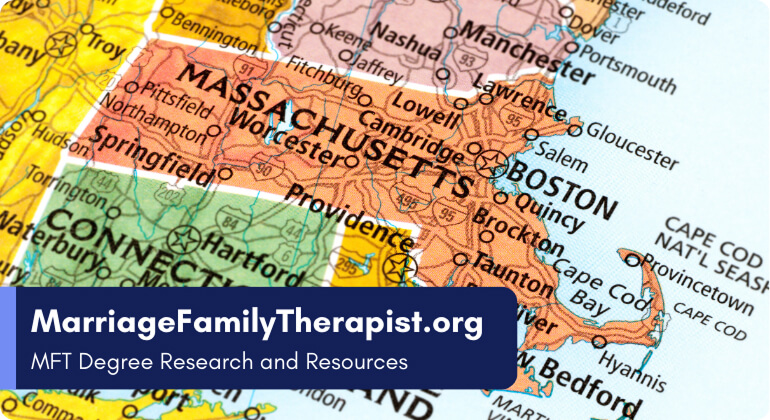Best Marriage & Family Therapy (MFT) Degree Programs in Massachusetts 2025
Massachusetts is an excellent place to pursue a degree in Marriage and Family Therapy (MFT), offering a supportive environment for aspiring therapists and strong pathways to licensure. With a high demand for mental health professionals and a diverse population in both urban and rural areas, the state provides meaningful clinical training opportunities for students pursuing careers as Licensed Marriage and Family Therapists (LMFTs). Whether you’re seeking a flexible online program or an immersive on-campus experience, Massachusetts offers a range of accredited MFT programs that prepare graduates for licensure and professional practice in a variety of clinical settings.
In this guide
2026 Best Marriage & Family Therapy (MFT) Programs in Massachusetts
William James College
Newton, MA - Private 4-year - williamjames.edu
Master's - Clinical Mental Health Counseling (Couples and Family Therapy)
Online & Campus Based - Visit Website
William James College's Clinical Mental Health Counseling Master's program features a Couples and Family Therapy concentration, preparing students for dual licensure as Mental Health Counselors and Marriage and Family Therapists. This 63-credit hybrid program requires no entrance exam and offers full-time (2 years) or part-time (3 years) options. Students complete at least 960 clinical hours with individual field placement support, focusing on multicultural competence and practical experience. The curriculum is designed for aspiring therapists to work effectively with diverse couples and families, enhancing career opportunities in mental health counseling without the need for standardized testing.
- 63-credit Master's concentration
- Dual licensure track (LMHC/LMFT)
- Minimum 960 clinical hours
- Full-time (2 years) or part-time (3 years)
- Multicultural curriculum focus
- On-campus program
- Individual field placement support
- Licensure-preparation curriculum
Springfield College
Springfield, MA - Private 4-year - springfield.edu
Master's - Marriage and Family Therapy
Campus Based - Visit Website
Springfield College's Marriage and Family Therapy graduate program offers Master's and Certificate options with flexible full-time or part-time study, including evening courses. The curriculum emphasizes family systems theory, multiple therapeutic approaches, and comprehensive counseling skills, grounded in the Humanics philosophy. Students complete 12 months of clinical experience with 15 hours of weekly fieldwork, preparing them for impactful careers in mental health, education, and community services. No undergraduate prerequisites are required, and the program does not mandate an entrance exam.
- Master's and Certificate options
- Full and part-time study available
- Evening course schedules
- 12-month clinical experience
- 15 hours weekly fieldwork
- Multiple therapy approach training
- Dual concentration option
- No undergraduate prerequisites
- Humanics philosophy emphasis
- Comprehensive counseling skills development
Other MFT Programs Available in Massachusetts
Boston College – Lynch School of Education and Human Development
Boston College’s Lynch School offers a COAMFTE-accredited Master’s in Counseling, with a specialization in Marriage and Family Therapy. This rigorous program emphasizes both theoretical foundations and practical clinical skills, leveraging the school’s strong ties to community mental health agencies for extensive internship opportunities (700+ hours required). Students benefit from a cohort model promoting collaboration and mentorship, and have access to specialized faculty expertise in areas like trauma-informed care, systemic family therapy, and culturally responsive practice. Notable program strengths include a high licensure exam pass rate and a dedicated career services department assisting graduates in securing post-graduate employment in diverse settings, from private practice to hospitals.
UMass Global – Master of Arts in Marriage and Family Therapy (Online)
UMass Global offers an online Master of Arts in Marriage and Family Therapy (MFT) designed to equip students with the skills necessary to navigate the complexities of relationships and help individuals, couples, and families overcome challenges. The curriculum, developed by practicing therapists, focuses on clinical evaluation, therapeutic environment creation, and evidence-based counseling techniques. The program emphasizes practical application through 400 supervised, in-person practicum hours, with field support available to assist students in securing clinical placements within their communities. Graduates are prepared for licensure and diverse career paths, including licensed marriage and family therapist, couples therapist, and child and adolescent therapist, leveraging their strengths in active listening, empathy, and cultural sensitivity.
Massachusetts’s Quickest MFT Programs
Some universities in Massachusetts offer accelerated pathways for students looking to complete their MFT degree in as little as two years. Several institutions structure their programs to integrate clinical training early, allowing students to complete supervised hours alongside coursework, which speeds up the process of meeting state licensure requirements.
For students needing flexibility, hybrid and online MFT programs allow them to take additional courses per semester while maintaining local practicum placements. Transfer students with previous psychology or counseling coursework may be eligible for course waivers, reducing overall time spent in the program.
Massachusetts has a strong network of hospitals, mental health clinics, and therapy practices, making it easier for students to find internship and practicum placements that fit their career goals. The ability to secure hands-on experience early significantly impacts how quickly students can transition into licensed professional roles.
Massachusetts’s Cheapest MFT Programs
The cost of earning an MFT degree in Massachusetts varies based on program type, school status (public vs. private), and available financial aid. Public universities offer lower tuition rates for in-state residents, making them a more cost-effective option for students.
Many MFT programs in Massachusetts provide scholarships, assistant-ships, and need-based grants, reducing the financial burden on students. Hybrid and online learning options allow students to reduce housing and commuting costs, making education more accessible.
Students working in mental health, social services, or related fields may qualify for employer tuition reimbursement, allowing them to earn their degree at a reduced cost. Additionally, Massachusetts participates in loan forgiveness programs for therapists who commit to working in underserved areas, particularly in community mental health settings.
With multiple funding opportunities and flexible degree formats, students in Massachusetts can complete their MFT education without accumulating excessive debt.
How to Become Licensed as an LMFT in Massachusetts
Step 1: Earn a Master’s or Doctorate in Marriage and Family Therapy
To become a licensed MFT in Massachusetts, students must complete a graduate program accredited by COAMFTE or an equivalent state-approved program. Coursework must include clinical training in psychotherapy, family systems, ethics, and mental health assessment.
Step 2: Complete 3,360 Hours of Supervised Experience
Massachusetts requires LMFT candidates to complete 3,360 hours of supervised clinical work, with at least 1,000 hours dedicated to direct client interaction. These hours must be overseen by a licensed MFT or an equivalent clinical supervisor.
This supervised experience allows candidates to apply their academic knowledge to real-life therapy settings, working with individuals, couples, and families to address mental health and relational concerns.
Step 3: Pass the National MFT Examination
LMFT candidates in Massachusetts must pass the Association of Marital and Family Therapy Regulatory Boards (AMFTRB) National MFT Exam. This standardized test assesses an applicant’s ability to conduct therapy, diagnose conditions, and develop effective treatment plans.
The exam ensures that therapists in Massachusetts meet national competency standards, ensuring they can provide high-quality mental health care.
Step 4: Apply for Licensure Through the Massachusetts Board of Registration of Allied Mental Health and Human Services Professions
After completing the required clinical experience and passing the national exam, candidates must submit an application for licensure through the Massachusetts Board of Registration of Allied Mental Health and Human Services Professions. This includes submitting proof of education, clinical hours documentation, national exam scores, and a background check.
Once approved, candidates receive their LMFT license, allowing them to practice independently.
Step 5: Maintain Licensure Through Continuing Education
Licensed MFTs in Massachusetts must renew their license every two years, completing 30 continuing education (CE) hours per renewal period. CE coursework must include:
- Legal and ethical training in family therapy
- Advanced clinical techniques in couples and family counseling
- Workshops on trauma-informed care and cultural competency
Maintaining continuing education requirements ensures that therapists remain updated on the latest therapy techniques and mental health research.
LMFT Career & Salary Outlook in Massachusetts
Marriage and Family Therapists in Massachusetts work in a variety of settings, including private practice, community counseling centers, hospitals, and school-based therapy programs. The average salary for LMFTs in Massachusetts is $67,500 per year, with experienced professionals earning over $95,000 annually.
Salaries and job opportunities vary based on geographic location and specialization. LMFTs working in Boston and Cambridge tend to earn higher salaries, while those in rural regions may qualify for loan forgiveness programs due to a higher demand for therapists.
The rise in telehealth services has further expanded job prospects, allowing LMFTs to provide therapy remotely while reaching clients in under-served areas across Massachusetts.
Massachusetts offers a diverse and rewarding career landscape for aspiring MFTs, with strong educational programs, structured licensure pathways, and growing job opportunities in both traditional and telehealth therapy. With numerous financial aid options, career specialization pathways, and a strong demand for mental health professionals, Massachusetts remains a top choice for students pursuing a career in Marriage and Family Therapy.


Related Articles
- Support That Affirms: Navigating Mental Health as LGBTQ+
- The ROI of an MFT Degree: Analyzing the Financial Investment in Your Therapy Career
- MFT Doctorate Degrees: DMFT vs PhD – Who Should Pursue Each Path?
- Who Will You Treat as a Marriage & Family Therapist? A Career Guide for Aspiring MFTs
- LMFT vs MFT: Is Licensure Necessary for Your Therapy Career?
- From Student to Therapist: What to Expect in Your MFT Clinical Internship